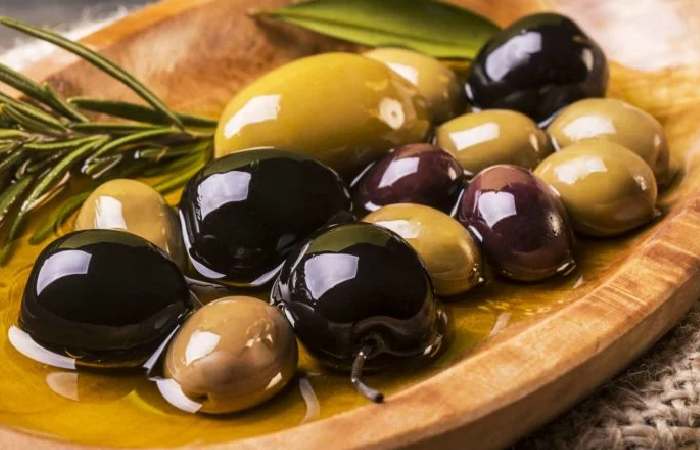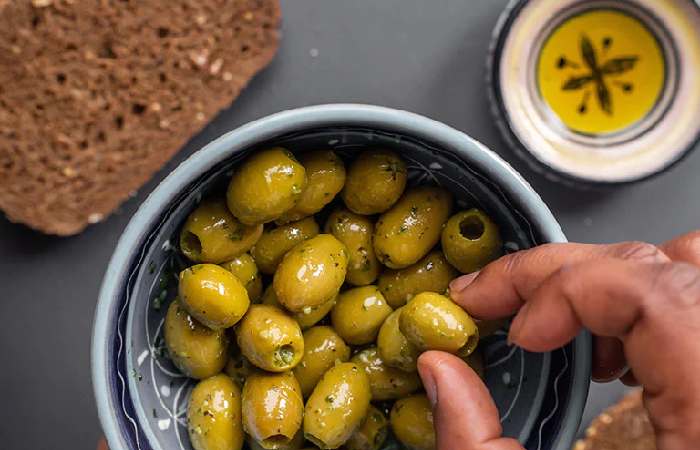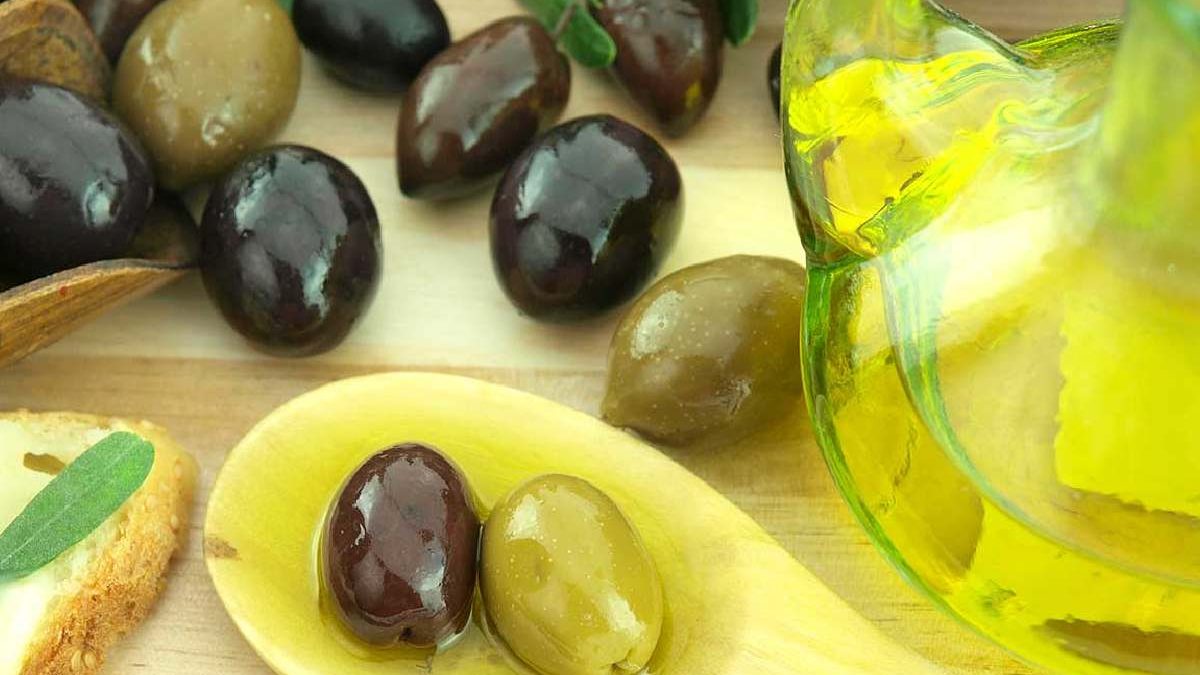11-health-benefits-and-side-effects-of-olives-benefits-of-olives
Olives are precisely a fruit but remain often classified as a vegetable. They are an excellent addition to salty dishes. Since the olives from the tree are too bitter to eat, they must remain cured to make them pleasant. With few exclusions, olives turn from lime to black as they ripen, although preserved black olives can be harvested green and then preserved and exposed to oxygen to darken. Yippee.
Olives (and their oil) are also high in well-monounsaturated fats and antioxidants. And as fermented food, they also cover probiotics.
People chiefly use olives for culinary drives, as a snack, or to drink olive oil. Depending on the form of the olive, they can taste whatever, from sour and salty to sweet.
Olives are one of the foods most high in polyphenols and are well known for their benefits.
Small Olives have nutrition as below per 100 grams
Calories: 115
Fat: 6-10 grams
Sodium: 735 mg
Carbohydrates: 6 grams
Fiber: 3.2 g
Sugars: 0 grams
Protein: 0.84 grams
Table of Contents
Health Benefits of Eating Olives – 11-health-benefits-and-side-effects-of-olives-benefits-of-olives

11-health-benefits-and-side-effects-of-olives-benefits-of-olives
1. Olives are full of healthy fats
In Mediterranean countries, 90% of olives remain processed to make olive oil. Olives contain 11-15% fat, of which 74% is oleic acid. Oleic acid is a monosaturated fatty acid that, when consumed, has been associated with health benefits against diseases which include the following:
- less inflammation (swelling)
- ability to fight cancer
- less chance of heart diseases
- decrease in blood pressure
2. Protects Brain Function
Brain function and health can deteriorate under the consequences of excessive infection and oxidation, somewhat that olives can help with. In addition to monounsaturated fats, which help reduce inflammatory load, some phenolic compounds found in olives may reduce molecules’ aggregation, which can lead to Alzheimer’s and Parkinson’s disorders. Since each condition has a strong inflammatory link, it makes sense that a food that reduces infection may show promise in treating them.
3. Antioxidant Properties
Olives are antioxidant powerhouses, which do everything from dipping inflammation to fighting off damaging bacteria. Studies have shown that eating olives can upsurge glutathione, an effective antioxidant, in the blood. These berries also defend against bacteria that cause infections in the airlines and stomach.
4. Good for Vision
Olives contain a good amount of vitamin A, an antioxidant that has remained shown to be helpful for eye health. These carotenoid antioxidants reduce age-related macular degeneration, may prevent cataract formation, and preserve the health of our optic nerve. Olives are also rich in Vitamin E.
5. Help Prevent Infections
Many of us do not realize this. However olives are a great support for our immune system, as they can reduce the chances of picking up any infection, be it bacterial, fungal, or viral. Are. Olives have long been used culturally for this purpose, including using leaves to manage topical wounds and infections. Olives also show potential in inhibiting the growth of the destructive bacteria MRSA—a strain resistant to many common prescription antibiotics.
6. Aids digestion
Olives contain high amounts of dietary fiber, providing about 20% of the daily fiber requirement. It is an important element of healthy bowel movements and digestive health. Eating appropriate dietary fiber can increase your stool bulk, reduce constipation, and make your bowel movements more frequent. You can reduce your risk of colorectal cancer and various dangerous gastrointestinal conditions by ensuring smooth flow through the track and colon.
7. Relieve Pain Naturally
Olives are full of phytochemicals, one of them known as oleocanthal. It’s a real anti-inflammatory multiple games, the action and result of numerous potent NSAID pain substitutes. It can be an essential remedy for chronic inflammatory situations, including arthritis, or after exercise. Choose a diet plan tall in olives instead of a pain substitute, and your health will love you for it!
8. Olives May Help Improve Your Gut Profile
Daily consumption of olives and olive oil plays an important role in supporting the health of our probiotic bacteria, providing them with the energy they need for survival. Consumption has remained associated with improvements in the colony size of several different probiotics, such as bifidobacteria, which help provide the body with natural antibiotics.
9. Prevent and cure diabetes
The Glycemic Index (GI) worth of foods and beverages remains based on their aptitude to increase blood sugar. Foods high in the glycemic directory are broken down fast and cause blood sugar and insulin degree opinions after a meal, shadowed by a fast drop in blood sugar levels. The sugar from olives is leisurely engrossed into the bloodstream, averting sugar crashes, cravings, and mood swings.
10. Aids in weight loss
While overall calorie limitation is important for measurable weight loss, consuming healthy fats can contribute greatly to your intention. Monounsaturated fat is one of the best fats to help mobilize free fatty acids, reduce inflammation related to rapid fat oxidation, and promote satiety overall. A hypocaloric diet remains strongly correlated with hunger pangs and cravings, a scenario where you can ensure you get enough high-quality fats in your meal plan.
11. Improve Heart Health
Olives contain a monounsaturated fat called oleic acid, which has continued to be linked to stopping cardiovascular diseases such as atherosclerosis, heart attacks, plaque build-up, and hit. Olive oil is where this oleic acid leftovers are found. It is answerable for high blood pressure and LDL (bad) cholesterol, plummeting the odds of cardiovascular complications and overall pressure on the system.
Side Effects of Eating Olives | Olive side effects

MUFAs are considered decent dietary fats. You may become some health aids if you switch saturated and trans fats with unsaturated fats, such as MUFAs and polyunsaturated fats (PUFAs). Even healthy fats like olive oil are high in calories, so use them in restraint.
Is it okay to eat olives daily?
Good fat Despite common misconceptions, olives do not contain fat. Eating healthy olives daily can help you enhance your memory.
For beauty Consuming healthy olives helps keep the skin soft and healthy as they contain oleic acid.
How to prepare Olives?
You can buy olives in many methods at most grocery stores. You can find them canned or packed in brine or water, and you might be able to find fresh olives at your grocery store or local Mediterranean specialty store.
Olives can remain served whole and often are when they appear on a charcuterie board or cheese plate.
It is possible to excerpt oil from olives and some olive oil, but the procedure is complicated. If you hunger to try it out, you’ll want to collect a few bits of equipment:
- Millstone or another millstone
- Blender
- It weighs like a brick or a heavy book
- Clean surface for pressing
- Bottles
- Funnel
The basic steps include cold pressing the olives to extract the olive oil and removing the rest. Cold pressing allows the oil to be extracted without the use of heat, keeping the oil as intact as possible.
Here are a few more ways to use olives and olive oil in recipes:
- Topped with hummus
- As a decoration or an ingredient in a cocktail
- As a base for salad dressing
- To change less healthy oils in baking recipes
- Slice to use in tapenade
- Slice and use as a pizza topping
- Add to pasta dishes
- Slice and use as a sandwich topping
FAQs
Q: What are the health assistances of eating olives?
A: Olives have many health assistance. They are a sound foundation of monounsaturated fats, contributing to dropping cholesterol and plummeting the risk of heart disease. They also shelter antioxidants that can defend the body from injury caused by free radicals. Olives are also a vitamin E, fiber base, and iron.
Q: Can olives benefit from weight loss?
A: Olives are high in healthy fats and calories, so you should beverage them in switch if you’re trying to lose weight. However, they can be an outstanding addition to a steady diet because they cover fiber and protein to support you feel full and fulfilled.
Q: Are there any side effects of the consumption of olives?
A: Olives are usually harmless, but some may be sensitive to them. Allergic responses can vary from slight to plain and cover symptoms such as hives, swelling, and effort living. Olives are also high in sodium, so people sensitive to sodium or have high blood pressure must limit their ingestion.
Q: Can eating olives recover digestion?
A: Olives are a sound basis of fiber, which can aid in the switch of digestion and stop constipation. They also include mixes that have antibacterial properties and can decrease gut annoyance.
Conclusion
They are helpful for human health as they contribute to decreasing the danger of inflammation conditions, heart disease, cancer, diabetes, etc.

